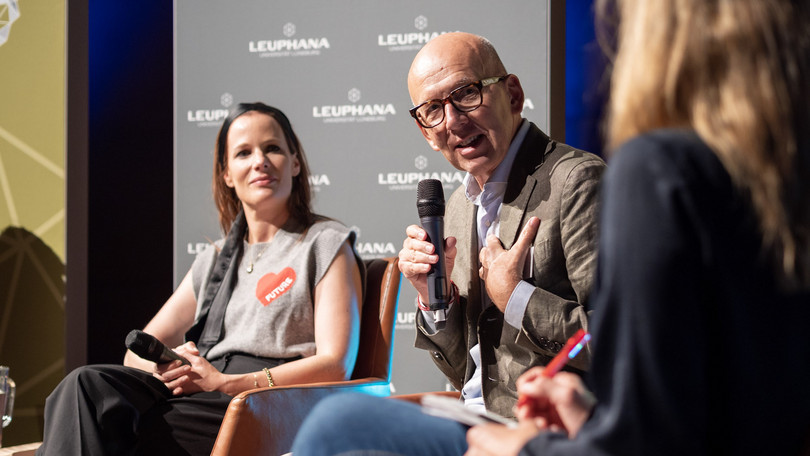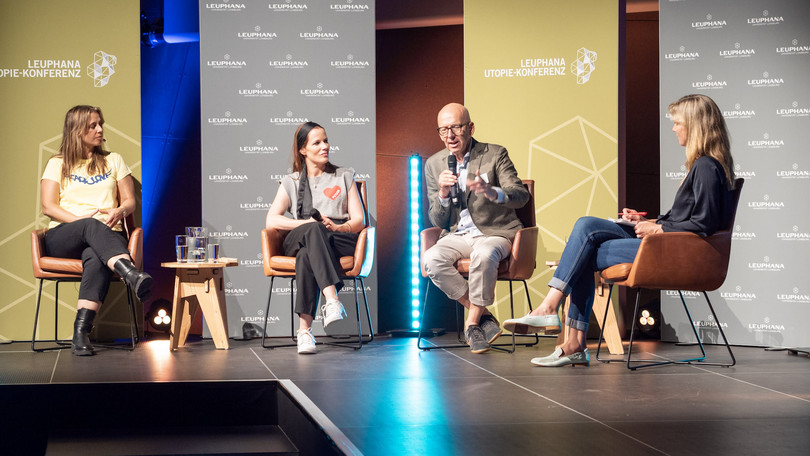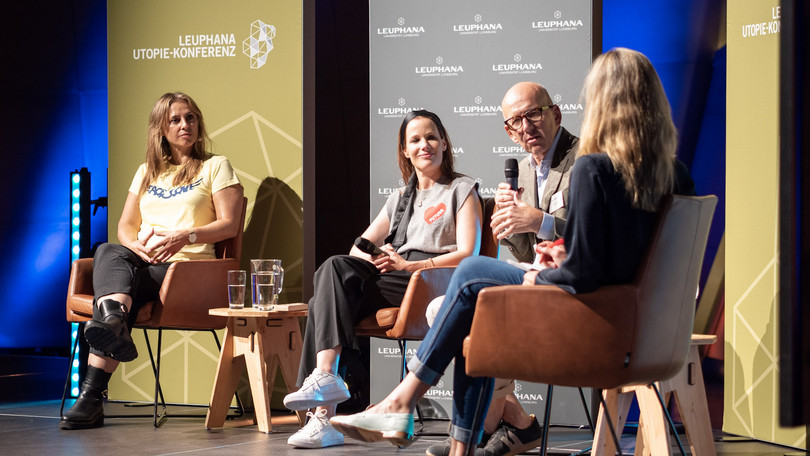Utopia Conference: ‘The Future is Like a Toothbrush’ – Florence Gaub and Heinz Bude
Panel Discussion
2024-09-16 On the second day of the Utopia Conference 2024, Florence Gaub, Director of Research at the NATO Academy in Rome, discussed the topic ‘How does trust change progress?’ with sociologist Heinz Bude. Jagoda Marinic and Maja Göpel moderated the discussion.
‘The future always takes place in the now,’ Florence Gaub states, ‘there is no right way to think about the future without utopia.’ She says this against the backdrop of the rounds on security topics, to which she is invited – almost always as the only woman. There, she says, the questionable rule of thumb ‘It'll be okay somehow, and right now is no time for utopia’ prevails. ‘But utopia always springs from the here and now.’
For Florence Gaub, the Arab Spring was a key event: “That was the moment when I thought: ‘How could we have foreseen this?’” With structured futurology, she confronts the widespread bullshit in foreign policy as well as the failure of the imagination. This failure is not only in the positive – one simply does not believe that the world can be better – but also in the negative, for example on 11 September 2001: “Before 9/11, we knew all the facts and background. But you just couldn't imagine that the assassins would really do it."
Maja Göpel proposes the image of the ‘grey rhinoceros’ for the phenomenon of being aware that something threatening is going to happen and yet doing nothing: “You see it coming, know almost everything about it, but you ignore it or think that it will turn before it runs you over.” The same applies to climate change, says Gaub, picking up on the idea, or to the war in Ukraine. “Since the nineties, Russia has openly announced its intention to attack Ukraine.” But that's the nature of the human mind: “You think, that's so bad, that just can't happen.” In view of this collective misjudgement, Gaub recommends not only pointing out facts or communicating best or worst scenarios, but also explicitly paying attention to the psychology of the decision-makers. She cites the civil war in Libya as an example. “Everyone knew there was going to be a war there. You could see many unsupervised men walking the streets with weapons months before, and that is always a reliable warning sign.” Gaub pointed this out at the time and received a lot of negative feedback for it. “What people said to me most often was, ‘Don't be so negative all the time’ – even the German ambassador to Libya at the time said that to me.” It was then that she realised she had to change her approach. “I realised that I had to become a ‘trusted adviser’ – that it wasn't enough to state facts and give realistic assessments of the future. You have to get people to trust you."
Heinz Bude also confirms that trust is the key point: “There has to be a reasonable point at which you stop doubting. If everything is only doubt, you no longer understand anything and do nothing.” Bude was part of a committee advising the Ministry of the Interior at the beginning of the Corona crisis. “The question at the time was: ‘Let it run its course or contain it?’’’ Bude says. “We knew that Germany, as an industrialised country, couldn't afford to shut down its factories. Instead, we decided to close the public economy, for example, cafes. We exposed our doubts at the time. We knew that we had to decide something now.”
He overcame his reservations and, above all, his doubts: ’Can I even say anything about this?’ The temptation was to simply suggest various equally likely outcomes. However, Bude realised that this was unsatisfactory and that it was necessary to recommend something specific and well-founded.
Gaub adds that the unease sometimes associated with the coronavirus measures shows what conditions must be met for people to trust: “A future is like a toothbrush. It has to be mine, otherwise I don't want it. By definition, the future is participatory.” The future has to feel like something you can participate in and actively shape.



